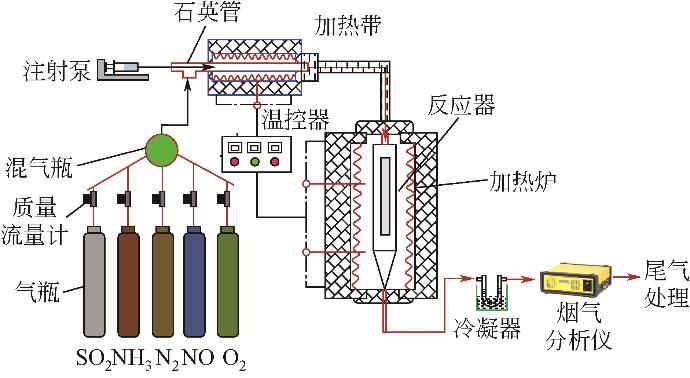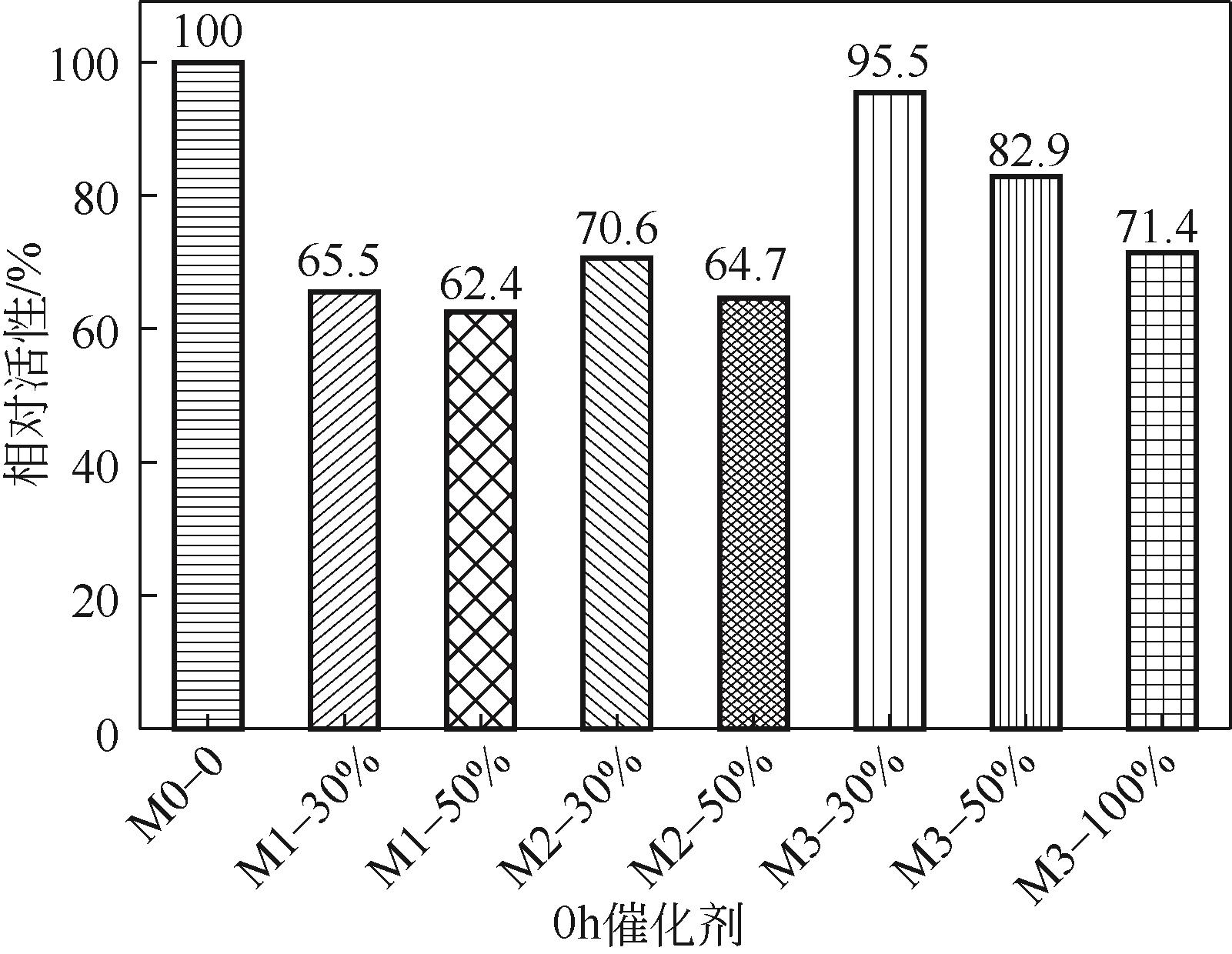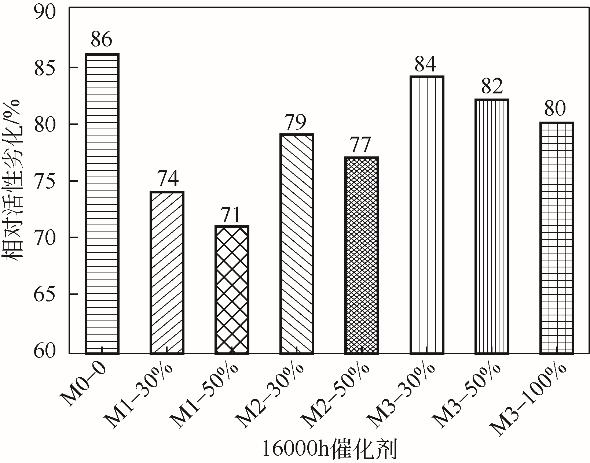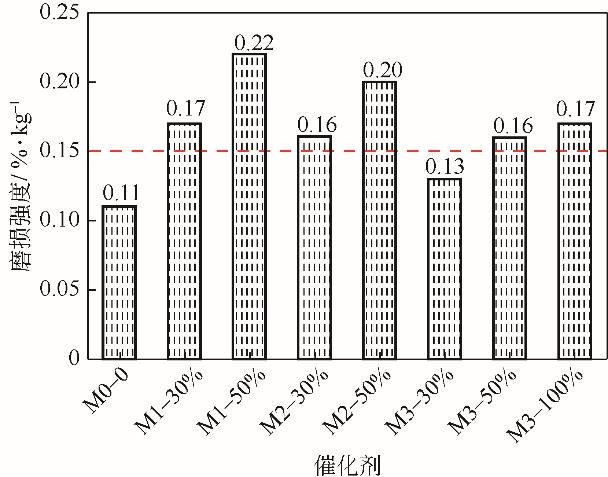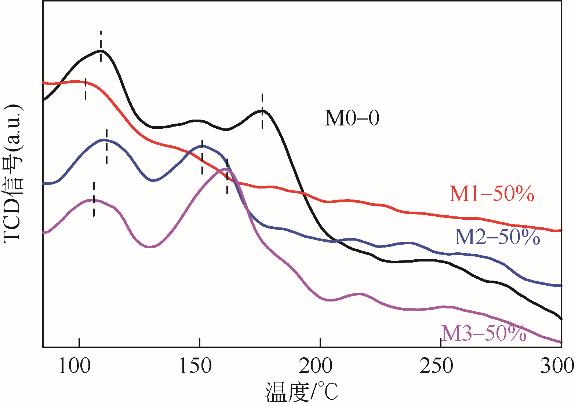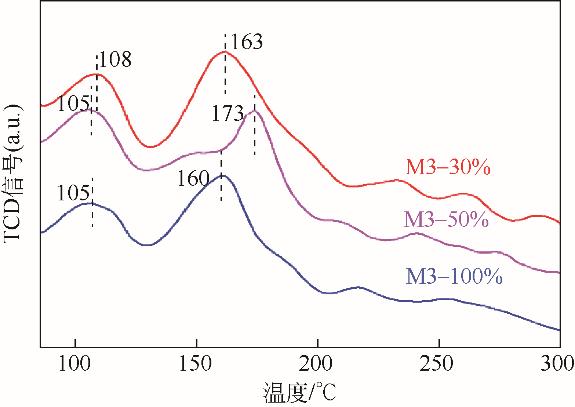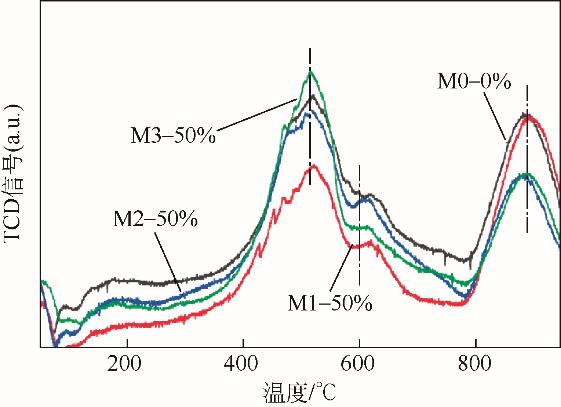| 1 |
何川, 王乐乐, 杨晓宁, 等. 废弃选择性催化还原催化剂混掺对新催化剂脱硝性能的影响[J]. 化工进展, 2018, 37(2): 581-586.
|
|
HE Chuan, WANG Lele, YANG Xiaoning, et al. Effects of spent SCR catalyst blending on the de-NO x activity of new catalyst[J]. Chemical Industry and Engineering Progress, 2018, 37(2): 581-586.
|
| 2 |
戚春萍, 武文粉, 王晨晔, 等. 燃煤电厂废旧SCR脱硝催化剂中TiO2载体的回收与再利用[J]. 化工学报, 2017, 68(11): 4239-4248.
|
|
QI Chunping, WU Wenfen, WANG Chenye, et al. Recycling and reuse of TiO2 carrier from waste SCR catalysts used in coal-fired power plants[J]. CIESC Journal, 2017, 68(11): 4239-4248.
|
| 3 |
姜烨, 高翔, 吴卫红, 等. 选择性催化还原脱硝催化剂失活研究综述[J]. 中国电机工程学报, 2013, 33(14): 18-31.
|
|
JIANG Ye, GAO Xiang, WU Weihong, et al. Review of the deactivation of selective catalytic reduction DeNO x catalysts[J]. Proceedings of the CSEE, 2013, 33(14): 18-31.
|
| 4 |
张荀, 柏源, 刘涛, 等. 火电厂氮氧化物控制对策研究[J]. 电力科技与环保, 2014, 30(1): 30-32.
|
|
ZHANG Xun, BAI Yuan, LIU Tao, et al. Thinking on control strategy and problems of industrialization for nitrogen oxides control in thermal power industry[J]. Electric Power Technology and Environmental Protection, 2014, 30(1): 30-32.
|
| 5 |
尚光旭, 司传海, 刘媛. “十三五”除尘脱硫脱硝行业政策导向及发展趋势[J]. 中国环保产业, 2016(10): 21-23.
|
|
SHANG Guangxu, SI Chuanhai, LIU Yuan. Industrial policy guiding and development trend of dust removal, desulfurization and denitration in “the thirteenth five-year plan”[J]. China Environmental Protection Industry, 2016(10): 21-23.
|
| 6 |
余岳溪, 廖永进, 李娟, 等. 废弃SCR脱硝催化剂无害化处理的研究进展[J]. 环境工程, 2016, 34(6): 136-139.
|
|
YU Yuexi, LIAO Yongjin, LI Juan, et al. Research progress of harmless treatment of waste scr denitration catalysts[J]. Environmental Engineering, 2016, 34(6): 136-139.
|
| 7 |
陈晨, 陆强, 蔺卓玮, 等. 燃煤电厂废弃SCR脱硝催化剂元素回收研究进展[J]. 化工进展, 2016, 35(10): 3306-3312.
|
|
CHEN Chen, LU Qiang, LIN Zhuowei, et al. Research progress of element recovery of waste De-NO x SCR catalyst from coal-fired power plants[J]. Chemical Industry and Engineering Progress, 2016, 35(10): 3306-3312.
|
| 8 |
段竞芳, 史伟伟, 夏启斌, 等. 失活钒钛基SCR催化剂性能表征及其再生[J]. 功能材料, 2012, 43(16): 2191-2195.
|
|
DUAN Jingfang, SHI Weiwei, XIA Qibin, et al. Characterization and regeneration of deactivated commercial SCR catalyst[J]. Journal of Functional Materials, 2012, 43(16): 2191-2195.
|
| 9 |
周凯, 陆斌, 王圣, 等. 废弃SCR脱硝催化剂中Ti、V、W元素回收工艺研究[J]. 电力科技与环保, 2019, 35(4): 8-13.
|
|
ZHOU Kai, LU Bin, WANG Sheng, et al. Research on recovery process of Ti, V and W in waste SCR denitration catalyst[J]. Electric Power Technology and Environmental Protection, 2019, 35(4): 8-13.
|
| 10 |
闫巍, 余智勇, 张畅, 等. 废弃SCR催化剂中钒和钨的浸出及回收[J]. 化工环保, 2018, 38(4): 471-475.
|
|
YAN Wei, YU Zhiyong, ZHANG Chang, et al. Leaching and recovery of vanadium and tungsten from spent SCR catalyst[J]. Environmental Protection of Chemical Industry, 2018, 38(4): 471-475.
|
| 11 |
周子健, 刘小伟, 葛振武, 等. 基于失活商业脱硝催化剂制备的再生SCR催化剂性能研究[J]. 中国电机工程学报, 2017, 37(9): 2614-2622.
|
|
ZHOU Zijian, LIU Xiaowei, GE Zhenwu, et al. NO reduction over a novel SCR catalyst regenerated from deactivated commercial DeNOx catalyst[J]. Proceedings of the CSEE, 2017, 37(9): 2614-2622.
|
| 12 |
华晨飞, 朱林, 姚杰, 等. 废烟气脱硝催化剂资源回用载体的品质及特性研究[J]. 中国电力, 2021, 54(2): 197-204.
|
|
HUA Chenfei, ZHU Lin, YAO Jie, et al. Research on the quality and characteristics of carriers for resource reuse of waste flue gas denitration catalyst[J]. Electric Power, 2021, 54(2): 197-204.
|
| 13 |
唐昊, 陆强, 杨江毅, 等. 废弃SCR催化剂的循环再利用及表征分析研究[J]. 燃料化学学报, 2018, 46(2): 233-242.
|
|
TANG Hao, LU Qiang, YANG Jiangyi, et al. Research on recycling and characterization analysis of the waste SCR catalyst[J]. Journal of Fuel Chemistry and Technology, 2018, 46(2): 233-242.
|
| 14 |
李彬彬. 废弃SCR脱硝催化剂资源化制备再生钛钨粉的研究[J]. 化学工业与工程, 2020, 37(3): 60-66, 73.
|
|
LI Binbin. Research on the preparation of regenerated titanium tungsten powder by recycling SCR denitration catalyst[J]. Chemical Industry and Engineering, 2020, 37(3): 60-66, 73.
|
| 15 |
毕冬雪, 李雅轩, 肖雨亭, 等. 废SCR脱硝催化剂再生与金属回收及载体回用技术[J]. 电力科技与环保, 2022, 38(3): 232-237.
|
|
BI Dongxue, LI Yaxuan, XIAO Yuting, et al. Waste SCR denitration catalyst regeneration and metal recovery and carrier reuse technology[J]. Electric Power Technology and Environmental Protection, 2022, 38(3): 232-237.
|
| 16 |
张琛. 废SCR催化剂中钒、钨的浸出与萃取分离研究[D]. 广州: 华南理工大学, 2016.
|
|
ZHANG Chen. Study on leaching and extraction separation of vanadium and tungsten from waste SCR catalyst[D].Guangzhou: South China University of Technology, 2016.
|
| 17 |
SHANG Xuesong, HU Gongren, HE Chi, et al. Regeneration of full-scale commercial honeycomb monolith catalyst (V2O5-WO3/TiO2) used in coal-fired power plant[J]. Journal of Industrial and Engineering Chemistry, 2012, 18(1): 513-519.
|
| 18 |
国家质量监督检验检疫总局, 中国国家标准化管理委员会. 蜂窝式烟气脱硝催化剂: [S]. 北京: 中国标准出版社, 2015.
|
|
General Administration of Quality Supervision, Inspection and Quarantine of the Republic of China, Standardization Administration of the People's Republic of China. Honeycomb-type DeNOxcatalysts: [S]. Beijing: Standards Press of China, 2015.
|
| 19 |
中华人民共和国工业和信息化部. 触媒用二氧化钛: [S]. 北京: 化学工业出版社, 2014.
|
|
Ministry of Industry and Information Technology of the Republic of China. Titanium dioxide for catalyst: [S]. Beijing: Chemical Industry Press, 2014.
|
| 20 |
HE Chuan, SHEN Boxiong, CHEN Jianhong, et al. Adsorption and oxidation of elemental mercury over Ce-MnO x /Ti-PILCs[J]. Environmental Science & Technology, 2014, 48(14): 7891-7898.
|
| 21 |
赵文雅, 李永红, 刘小娇, 等. Fe改性Cu-SSZ-13的方法对催化剂NH3-SCR脱硝性能的影响[J]. 化工进展, 2016, 35(12): 3898-3906.
|
|
ZHAO Wenya, LI Yonghong, LIU Xiaojiao, et al. Effect of preparation methods on de-NO x performance of Fe/Cu-SSZ-13 catalyst for NH3-SCR[J]. Chemical Industry and Engineering Progress, 2016, 35(12): 3898-3906.
|
| 22 |
CHEN Liang, LI Junhua, GE Maofa. The poisoning effect of alkali metals doping over nano V2O5-WO3/TiO2 catalysts on selective catalytic reduction of NO x by NH3 [J]. Chemical Engineering Journal, 2011, 170(2/3): 531-537.
|
| 23 |
WANG Yinyin, SHEN Boxiong, HE Chuan, et al. Simultaneous removal of NO and Hg0 from flue gas over Mn-Ce/Ti-PILCs[J]. Environmental Science & Technology, 2015, 49(15): 9355-9363.
|
| 24 |
乔南利, 杨忆新, 刘清龙, 等. 载体物化性质对锰铈催化剂NH3-SCR脱硝性能的影响[J]. 燃料化学学报, 2018, 46(6): 733-742.
|
|
QIAO Nanli, YANG Yixin, LIU Qinglong, et al. Influence of different supports on the physicochemical properties and denitration performance of the supported MnCe-based catalysts for NH3-SCR[J]. Journal of Fuel Chemistry and Technology, 2018, 46(6): 733-742.
|
| 25 |
LIU Shanshan, WANG Hao, WEI Ying, et al. Morphology-oriented ZrO2-supported vanadium oxide for the NH3-SCR process: Importance of structural and textural properties[J]. ACS Applied Materials & Interfaces, 2019, 11(25): 22240-22254.
|
| 26 |
汤常金, 孙敬方, 董林. 超低温(<150℃)SCR脱硝技术研究进展[J]. 化工学报, 2020, 71(11): 4873-4884, 5362.
|
|
TANG Changjin, SUN Jingfang, DONG Lin. Recent progress on elimination of NO x from flue gas via SCR technology under ultra-low temperatures(<150℃)[J]. CIESC Journal, 2020, 71(11): 4873-4884, 5362.
|
| 27 |
姚燕, 马云龙, 杨晓宁, 等. 高砷煤SCR脱硝催化剂中毒失活研究[J]. 中国电力, 2020, 53(6): 191-196.
|
|
YAO Yan, MA Yunlong, YANG Xiaoning, et al. Deactivation of honeycomb SCR catalysts in high-arsenic coal-fired power plant[J]. Electric Power, 2020, 53(6): 191-196.
|
 ), 杨万荣2, 姚燕1, 刘涛3, 何川1, 刘逍2, 苏胜3, 孔凡海1, 朱仓海2, 向军3
), 杨万荣2, 姚燕1, 刘涛3, 何川1, 刘逍2, 苏胜3, 孔凡海1, 朱仓海2, 向军3
 ), YANG Wanrong2, YAO Yan1, LIU Tao3, HE Chuan1, LIU Xiao2, SU Sheng3, KONG Fanhai1, ZHU Canghai2, XIANG Jun3
), YANG Wanrong2, YAO Yan1, LIU Tao3, HE Chuan1, LIU Xiao2, SU Sheng3, KONG Fanhai1, ZHU Canghai2, XIANG Jun3
